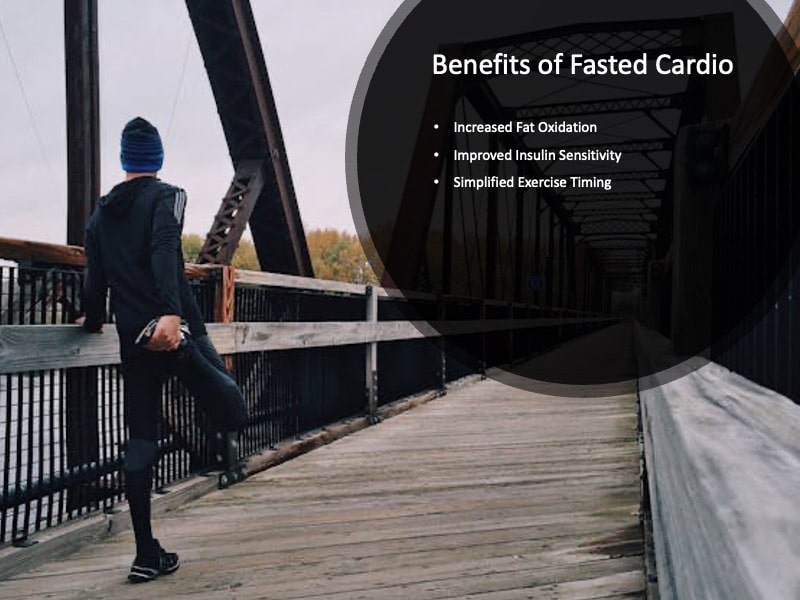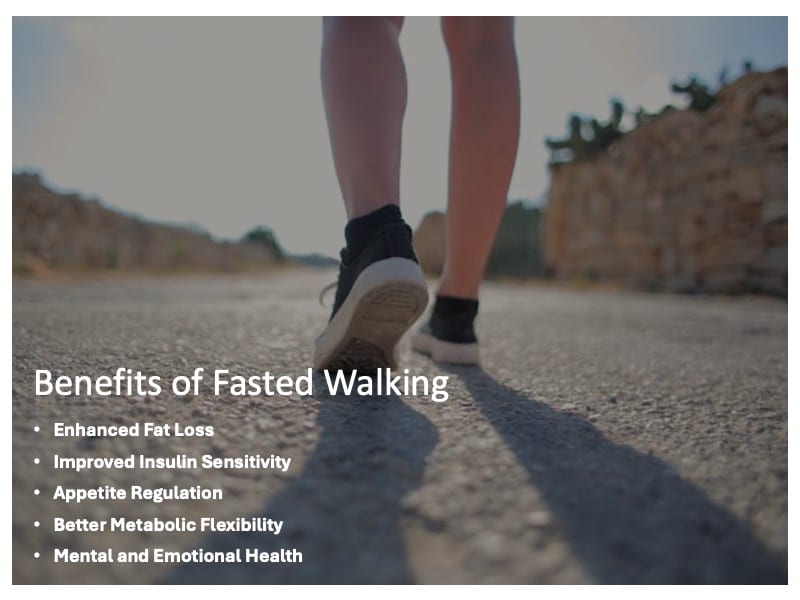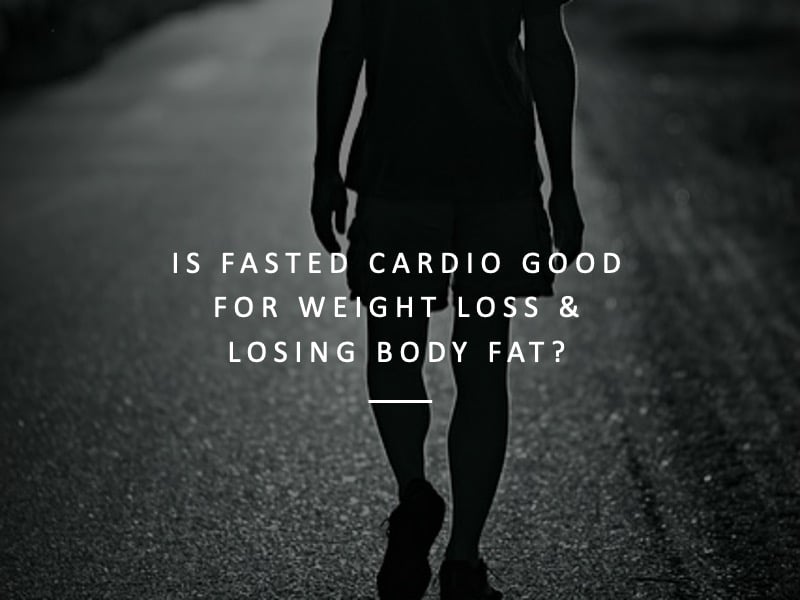Is Fasted Cardio Good for Weight Loss & Losing Body Fat?
When it comes to weight loss, the benefits of fasted cardio have become a hotly debated topic.
Fasted cardio involves engaging in cardiovascular exercises, such as running or cycling, on an empty stomach before eating breakfast.
The theory behind fasted cardio is that by exercising in a fasted state, the body will burn fat more efficiently, leading to greater weight loss results.
But what does the research say?
This article digs into research investigating the effects of exercise in the fasted state on muscle biochemistry and metabolism linked to glycemic control and insulin sensitivity and explores whether fasted cardio may be an effective strategy for weight loss.
What is Fasted Cardio?

Fasted cardio refers to engaging in aerobic exercises such as brisk walking, running, cycling, or swimming after an overnight fast or several hours without food.
This is typically done first thing in the morning, before breakfast, when the body is in a prolonged fasted state.
During this time, glycogen stores—the body’s primary energy reserves—are lower, encouraging the body to tap into fat stores for energy.
This type of workout can range in intensity and duration depending on an individual’s fitness goals and experience level.
For beginners, low-intensity activities such as walking may be more appropriate, while advanced athletes may incorporate moderate to high-intensity sessions like running or interval training.
The versatility of fasted cardio makes it accessible to individuals across all fitness levels, but its effects and safety must be tailored to individual needs and goals.
How Does Fasted Cardio Work?
The effectiveness of fasted cardio lies in the metabolic state induced by fasting. After several hours without food, the body depletes its glycogen stores and begins relying on alternative energy sources.
As glycogen levels drop, the body shifts to burning stored fat for fuel, a process known as fat oxidation. This shift in energy utilization is believed to be one of the key reasons fasted cardio is linked to enhanced fat burning and weight loss.
During fasting, insulin levels are also lower, which is another critical factor. Insulin suppresses lipolysis (the breakdown of fat), and lower levels during fasting allow the body to mobilize fatty acids more effectively.
This hormonal environment creates a prime opportunity for the body to oxidize fat during exercise.
Additionally, fasting increases levels of norepinephrine, a hormone that stimulates fat breakdown and can further enhance energy availability during workouts.
While this metabolic adaptation offers promising fat-burning benefits, it’s essential to recognize that the overall effectiveness of fasted cardio depends on factors like exercise intensity, duration, and overall energy balance throughout the day.
Benefits of Fasted Cardio for Weight Loss
Fasted cardio provides a range of benefits that can support weight loss and overall metabolic health. While its effectiveness varies based on individual factors, the following are some of its most notable advantages:
Increased Fat Oxidation
Multiple studies have shown that exercising in a fasted state promotes higher fat oxidation compared to fed-state exercise.
A study by Vieira et al. (2016) highlighted that fasting lowers insulin levels, which allows the body to mobilize and burn fatty acids more effectively during workouts. This makes fasted cardio particularly appealing for individuals aiming to maximize fat loss over time.
Increased Usage of Stored Fat for Energy
Fasted cardio increases reliance on stored fat for energy, which may complement other weight loss strategies.
When paired with a calorie-controlled diet and proper post-workout nutrition, fasted cardio can help optimize fat loss without sacrificing muscle mass.
Improved Insulin Sensitivity
Fasted cardio has been associated with enhanced insulin sensitivity, which refers to the body’s ability to respond to insulin and regulate blood sugar levels.
Research suggests that improving insulin sensitivity not only aids in weight loss but also reduces the risk of developing chronic conditions like type 2 diabetes.
This benefit makes fasted cardio an appealing option for overweight individuals looking to improve metabolic health.
Simplified Morning Routine
For those with busy schedules, fasted cardio eliminates the need to prepare and consume a pre-workout meal, streamlining the morning routine.
This simplicity can help individuals remain consistent with their fitness goals, especially if they find it challenging to schedule workouts later in the day.
Research has shown that morning workouts may enhance weight loss by improving adherence to exercise routines and boosting metabolism early in the day, leading to increased calorie expenditure throughout the day (Schumacher et al., 2020).
By creating a consistent morning workout habit, individuals can set the tone for an active and healthy day while optimizing their weight loss efforts.
Negatives of Fasted Cardio
While fasted cardio has several potential benefits for weight loss, there are also some drawbacks to consider:
- Risk of Muscle Breakdown: Engaging in fasted cardio for an extended period without proper nutrition can lead to muscle breakdown. This is because the body may break down muscle tissue for energy when it is in a fasted state for too long. To prevent this, it’s important to refuel properly after fasted cardio.
- Fatigue and Lack of Energy: Working out on an empty stomach can lead to feelings of fatigue and lack of energy, especially during high-intensity exercise. This can lead to a decrease in workout intensity and overall calorie burn.
How to Incorporate Fasted Cardio into a Weight Loss Program
If you’re interested in incorporating fasted cardio into your weight loss program, here are some tips to consider:
- Best Time to Engage in Fasted Cardio: The best time to engage in fasted cardio is typically in the morning before breakfast. This allows you to maximize the benefits of being in a fasted state while also jumpstarting your metabolism.
- Recommended Duration and Frequency: Engaging in fasted cardio for 30-60 minutes, 2-3 times per week is recommended. This allows you to reap the benefits of fasted cardio while balancing it with other forms of exercise and proper nutrition.
Best Fasted Cardio Workouts for Weight Loss

Fasted walking is a popular form of fasted cardio because it is simple, effective, and has numerous health benefits.
Along with the benefits of walking for weight loss, fasted walking has other unique health benefits.
It’s a low-intensity exercise that can help improve cardiovascular fitness, maintain a healthy body weight, and reduce stress levels.
Moreover, walking in a fasted state has additional benefits that include:
- Reducing Stress and Helping You Clear Your Mind
- Improving Your Libido
- Strengthening Your Bones
- Improving Cardiovascular Health and Fitness
Fasted walking is particularly effective and one of the best cardio workouts for weight loss because during light physical activity (20-40% of VO2 Max), fatty acids are utilized by the body as the primary fuel source.
This means that walking in a fasted state can lead to increased fat burning and improved fat loss results.
In contrast, high-intensity fasted cardio workouts are less effective for weight loss because they rely more heavily on glycogen stores for energy rather than fat, even in a fasted state.
These types of cardio workouts can also elevate cortisol levels significantly, increasing the risk of muscle breakdown and potentially impairing recovery and long-term progress.
Additionally, high-intensity training in a fasted state can lead to fatigue, decreased performance, and an increased likelihood of injury, making it less suitable for those aiming to optimize fat loss.
Therefore, based on the research and numerous health benefits, fasted walking can be considered the best form of fasted cardio for fat loss.
It is a low-impact and accessible form of exercise that can be easily incorporated into daily routines to support weight loss and overall health.
Combining Fasted Cardio & Intermittent Fasting
Intermittent fasting, also known as time-restricted feeding, involves restricting eating to a specific window of hours and fasting during the rest of the day.
When combined with fasted cardio, this approach can lead to greater fat-burning and weight loss.
Research suggests intermittent fasting can have numerous health benefits, including weight loss, improved insulin sensitivity, and reduced risk of chronic diseases such as cardiovascular disease and type 2 diabetes.
A study published in the Journal of Translational Medicine found that an intermittent fasting program, in which all calories are consumed within an 8-hour window each day, in conjunction with resistance training, could improve health-related biomarkers, decrease fat mass, and maintain muscle mass in resistance-trained males.
This study demonstrated that intermittent fasting makes it possible to lose fat and keep muscle!
When combined with fasted cardio, intermittent fasting can further enhance the benefits of both approaches.
During the fasted state, the body performs a chemical reaction called lipolysis, which leads to an increased rate of fatty acid and glycerol release into the bloodstream.
This, in turn, can lead to greater fat burning during exercise, particularly when engaging in cardiovascular exercise such as running or cycling.
To properly implement intermittent fasting, it is important to eat a regular amount of calories during the feeding window and fast during the rest of the day.
This could involve restricting eating to an 8-hour window and fasting for 16 hours, for example.
It is also important to stay hydrated during the fasting period, particularly when engaging in exercise.
Can You Drink Tea or Coffee Before Fasted Cardio?

Drinking tea or coffee before fasted cardio is a great way to increase lipolysis without “breaking your fast.”
However, you must drink your tea or coffee without additional sugar, milk, or other sweeteners.
A few of my favorite types of tea to drink while fasting includes:
- Green Tea
- Matcha Tea
- Oolong Tea
- Black Tea
- Yerba Mate Tea
Drinking coffee is healthy for weight loss, and drinking coffee before fasted cardio might be even more valuable because it can induce autophagy, a process where your body removes dead cells and refreshes itself.
What to Eat After Fasted Cardio
After fasted cardio, it’s important to refuel your body with the proper nutrients to aid in recovery and support overall health.
Here are some tips on what to eat after fasted cardio:
- Protein: Aim to consume a high-quality source of protein within 30 minutes after your workout to aid in muscle recovery and growth. Good options include eggs, Greek yogurt, protein shakes, and lean meats.
- Carbohydrates: Consuming carbohydrates immediately after your workout helps replenish glycogen stores and provide energy for future workouts. Healthy carbohydrate sources include fruits, whole grains, and starchy vegetables.
- Healthy Fats: Consuming healthy fats after fasted cardio can help support overall health and increase satiety. Good options include nuts, seeds, avocado, and olive oil.
- Hydration: Rehydrating after any workout, including fasted cardio, is important. Aim to consume water or a hydrating drink such as coconut water to replenish fluids lost during exercise.
- Avoid Overeating: While consuming a large meal after fasted cardio may be tempting, it’s important to listen to your body and avoid overeating. Consuming a moderate-sized meal with balanced protein, carbohydrates, and healthy fats can provide the necessary nutrients for recovery without causing discomfort or overeating.
Refueling your body with the proper nutrients after fasted cardio can aid in muscle recovery, replenish energy stores, and support overall health.
Aim to consume a balance of protein, carbohydrates, and healthy fats while avoiding overeating.
Don’t forget to hydrate to replenish fluids lost during exercise.
Final Thoughts: Is Fasted Cardio Good for Weight Loss?

Fasted cardio has become increasingly popular as an exercise strategy for weight loss.
While pre-exercise nutrition is important for athletic performance, fasted exercise can promote unique metabolic adaptations and play a role in weight management.
Research suggests that fasted-state exercise increases post-exercise circulating free fatty acids and improves plasma lipid profiles, which can reduce energy intake throughout the day.
Fasted-state exercise has also improved insulin sensitivity in healthy subjects, making it a potential strategy for individuals with type 2 diabetes.
If you’re looking to get the most out of your daily workout, consider scheduling morning workouts before breakfast to maximize fat-burning and weight loss.
However, there are some drawbacks to consider, such as the risk of muscle breakdown and feelings of fatigue, and lack of energy.
To incorporate fasted cardio into a weight loss program, it’s important to choose the best time for engaging in fasted cardio, follow recommended duration and frequency, and consider combining it with other forms of exercise for maximum benefits.
Despite some limitations, incorporating fasted cardio into a balanced exercise and nutrition program can be an effective strategy for weight loss.
This website does not provide medical advice. This website site does contain affiliate links, and purchases may earn a commission.
Read my Medical Disclaimer, Review Disclaimer, and Publishing Policies for more details. Use of this site indicates acceptance of these terms.



